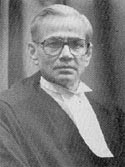
Meet Justice V.N. Khare and his Notable Judicial decisions
Justice Vishweshwar Nath Khare served as the 33rd Chief Justice of India from December 19, 2002, to May 1, 2004. Born in Allahabad in 1939, he began his legal career in the Allahabad High Court in 1961, focusing on civil, writ, and revenue matters. He rose through the judiciary as Chief Standing Counsel for the Uttar Pradesh government, became a judge of the Allahabad High Court in 1983, Chief Justice of the Calcutta High Court in 1996, and was elevated to the Supreme Court in 1997.
Judicial Career and Philosophy
Justice Khare was known for his commitment to judicial independence, integrity, and human rights. Over his eight-year tenure on the Supreme Court, he authored 223 judgments, with a focus on property, civil, and service law. He was lauded for upholding the dignity of the judiciary and reinforcing public faith in the institution.
Landmark Judgments
1. Best Bakery Case and Gujarat Riot Trials (2002–2004)
Justice Khare’s most notable intervention came in response to the failure of the justice system following the 2002 Gujarat riots. Observing collusion between the prosecution and the accused, and widespread witness intimidation, he ordered a retrial of the Best Bakery case outside Gujarat, transferring it to Maharashtra. This unprecedented move by the Supreme Court ensured protection for victims and witnesses and set a new standard for judicial intervention in cases of state failure and communal violence. Khare described the events as a breakdown of the rule of law and, in later interviews, referred to the violence as “state-sponsored genocide”.
2. Union of India v. Navin Jindal (2004) – Right to Fly the National Flag
Justice Khare presided over the bench that upheld the fundamental right of citizens to fly the national flag as an expression of freedom of speech and expression under Article 19(1)(a) of the Constitution. The Court held that prior restrictions, which limited flag display to certain days and government buildings, were unconstitutional, and clarified that the Flag Code of India was not a law but a set of executive instructions.
3. State of Uttar Pradesh v. Raj Narain (1975) – The Emergency Case
As an advocate, Khare represented Prime Minister Indira Gandhi in the landmark case where she was accused of electoral malpractices. The Allahabad High Court’s decision against Gandhi led to her disqualification and the subsequent declaration of Emergency in India, marking a historic suspension of democracy.
Legacy
Justice V.N. Khare is remembered for his courage in confronting state failures, his defense of individual rights, and his efforts to restore the credibility of the judiciary during times of crisis. His interventions in the Gujarat riot cases and his progressive stance on civil liberties have left a lasting mark on Indian jurisprudence.












comments